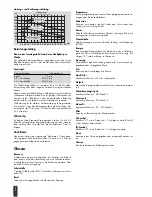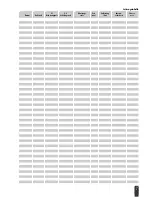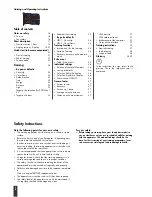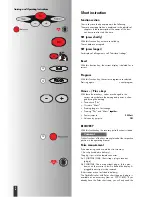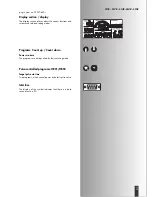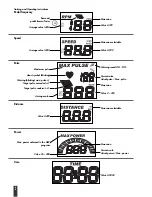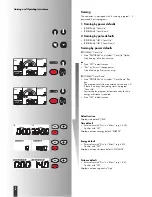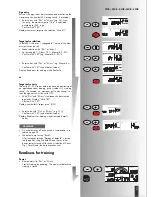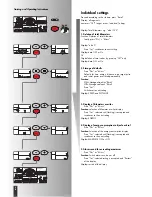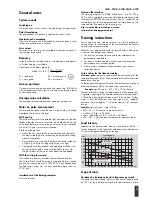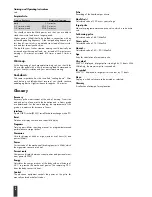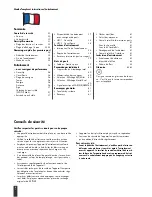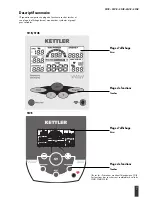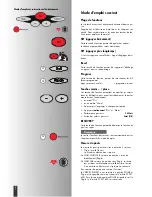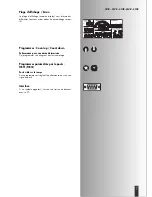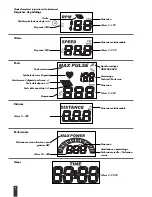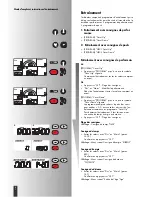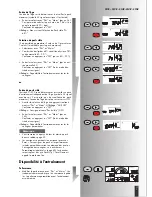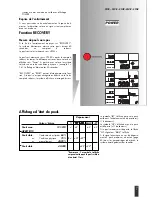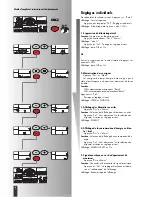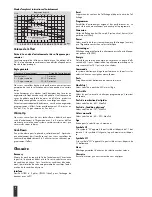
Pulse
Recording of the heartbeat per minute
MaxPulse(s)
Calculated value of 220 minus years of age
Target pulse
Manual or program-determined pulse value, which is to be achie-
ved.
Fat burning pulse
Calculated value of: 65% MaxPuls
Fitness pulse
Calculated value of: 75% MaxPuls
Manual –
Calculated value of: 40 – 90% MaxPuls
Age
Entry for calculation of maximum pulse.
HI symbol
With “HI” displayed, a target pulse is too high by 11 beats. With
HI blinking, the maximum pulse is exceeded.
LO symbol
With “LO” displayed, a target pulse is too low by 11 beats.
Menu
Display in which values are to be entered or selected.
Glossary
A collection of attempts for explanation.
ved.
Empirical rule:
You should choose the Watts power such that you are able to
stand the muscle load over a longer period.
Higher powers (Watt) should be yielded in connection with an
increased pedaling frequency. A too low pedaling frequency of
less than 60 rpm results in a pointedly static load of the muscula-
ture and thus to early exhaustion.
The load for your further stamina training should basically be
increased over the scope of load, e.g. instead of 10 minutes your
training is 20 minutes or instead of 2 times a week 3 times a
week.
Warm-up.
At the beginning of each ergometer training unit, you should for
3-5 minutes pedal with a slowly increasing load to warm and to
get your heart/circulation and your musculature moving.
Cool-down
The same importance has the so-called “cooling down”. After
each training unit (after/without recovery) you should continue
pedaling against a slight resistance for approx. 2-3 minutes.
Glossary
Recovery
Recovery pulse measurement at the end of training. From start
and end pulse of one minute the deviation and a fitness grade
are determined. For the same training, the improvement of this
grade is a measure for increase in fitness.
Interface
9-pole SUB-D socket (RS232/serial) for data exchange with a PC.
Reset
Deletion of display contents and restart of display.
Programs
Training possibilities requiring manual or program-determined
performances or target pulses.
Dimension
Units for display of km/h or mph, kjoule or kcal, hours (h) and
power (Watts)
Power
Current value of the mechanical (braking) power in Watts, which
the ergometer converts into heat.
Percent scale
Comparison display between current power and personal maxi-
mum power (400W)
Energy
Calculates the energy turnover of the body with an efficiency of
25 % to provide the mechanical power. The remaining 75 %
does the body convert to heat.
Control
The electronic equipment controls the power or the pulse for
manually entered or default values.
Training frequency
Duration of training
daily
10 minutes
2–3 times a week
20–30 minutes
1–2 times a week
30–60 minutes
28
GB
Training and Operating Instructions
Summary of Contents for SF1B
Page 143: ...143 RUS SF1B SF2B SF3B SF4B SF5B SF1B SFB SF2B SF4B SF5B SF2B SF1B SF3B...
Page 145: ...POLAR Plug In 07937 600 POLAR Plug In 07937 650 HRC1 HRC2 145 RUS SF1B SF2B SF3B SF4B SF5B...
Page 146: ...146 RUS G 11 0 499 HRC HRC Programm 25 400 0 220 0 99 9 0 199 AVG AVG 0 99 59 1 11...
Page 147: ...3 0 25 Power 5 5 4 POWER 147 RUS SF1B SF2B SF3B SF4B SF5B 0 9999...
Page 155: ...155 RUS P1 P2 O...
Page 156: ...HEINZ KETTLER GmbH Co KG Postfach 1020 D 59463 Ense Parsit www kettler net docu 1445j 09 14...

